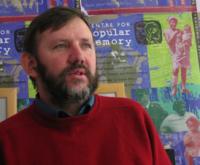Posted on October 27, 2010

Oral history interviews primarily focus on memories of lived experiences (i.e. first person narratives) constructed through oral story-telling and performances. Since the mushrooming of oral history projects in the 1980s and again in the post-TRC period, oral historians, anthropologists, sociologists and various qualitative researchers paid considerable attention to the stories of victims of various pre-apartheid or apartheid forms of violence. However, the History discipline has tended to neglect family and especially children's experiences of apartheid violence. Internationally, cross-generational memory studies have been well developed within Holocaust Studies but far less beyond this specific field. Moreover, while childhood and family dynamics have been rigorously researched within the psychology discipline, there are research lacunae related to childhood, memory and subjectivity within the History discipline. For example, in the rare occasions when children do figure in historical research they tend to be portrayed as passive victims at the mercy of parents or other adults. The exception is literature on student protests and activism but these studies tend to have an overt political resistance framing, where family life rarely features. But children in general do hold various forms and conditions of agency, which fluctuate over time. In my view, the time has come for historians, memory and heritage researchers in South Africa to pay more attention to how 'childhood' and 'families' have been, and continue to be, shaped by the legacies of apartheid and pre-apartheid pasts.
A significant task, however, involves the need to re-think what is meant by the term 'the family', given that nuclear and extended family structures have been dramatically impacted on by the apartheid system, poverty and the HIV/Aids pandemic. In our initial research planning at the Centre for Popular Memory a proposed central focus will be on identifying the discrepancies between: the facts of past and present family life in South Africa and how people select, remember, forget and imagine their childhood/family memories. This we think will be fertile terrain for historicizing and analyzing the contradictions of human subjectivity. In part, my own interest in 'family histories' stems from a broader aim to explore what 'historicising human subjectivity' might involve intellectually and epistemologically. Furthermore, we are thinking about how to do ethical and rigorous research involving life and family history interviews as well as the collection and use of family images/albums as mnemonic triggers and sources for the construction of 'family histories'.
Another crucial theme is how experiences of violence tend to leave behind 'traumatic traces', which continue to be reconstructed through individual and collective memory forms. Dominic LaCapra argues that 'limit events' are created by 'traumatic experiences', which are 'incomprehensible' (in part, 'trauma' is always outside of language) and/or emotionally 'intolerable' to victims. But do we know enough about how living with post-traumatic legacies is or is not 'transmitted' to the next generation? How can we move beyond a bio-medical understanding that portrays 'trauma' like a 'disease' that 'infects' the next generation? In our view, the bio-medical frame is conceptually problematic and we therefore need to re-think the concept 'trauma' as an inter-subjective construction, and to consider whether 'trauma' is in fact 'transmitted'. I have no doubt that this will sound controversial to many readers, but do bear me out: I am suggesting that we rather need to explore how the parenting styles, behaviour and actions of 'trauma victims/survivors' has been affected by how they live with their own post-traumatic legacies on a daily basis. In short, the post-traumatic legacies of parents/caregivers are inter-subjectively constructed between themselves and their children. I am suggesting that we have yet to adequately understand the social and emotional dimensions of the inter-subjective construction of the 'impact' on the next generations.
This inter-subjective approach might be a fruitful avenue to reconceptualising and researching 'family histories'. Whatever our approach or paradigm, we must move with a great deal of sensitivity and respect, and simultaneously we need to ask challenging questions of ourselves as academic researchers and as members of our own families. Self-reflexivity is crucial, and it is essential to work through what our emotional investment might be in doing this kind of research and intellectual work.
I am also proposing that historians, memory, heritage professionals and those in cognate disciplines need to do more work on how childhood/family experiences and memories have been shaped by what has historically occurred in - and specifically around - the space we call 'home' or the 'family home'. For example, it is common for us to wax lyrical about 'communities' and 'publics' but what currency do these concepts have if we continue to ignore 'the family' in its diverse, real and imagined, forms? And finally, in developing Heidi Grunebaum's term - 'the archive of the ordinary' - perhaps we should explore both 'the family' that nurtured us as children and the 'intellectual family' (and its heritage) that continues to constitute us? Maybe the critique of these particular 'family histories' should be directed towards the symbolic 'fathers and mothers' of our respective professional disciplines.
Sean Field is director of the Centre for Popular Memory at the University of Cape Town.